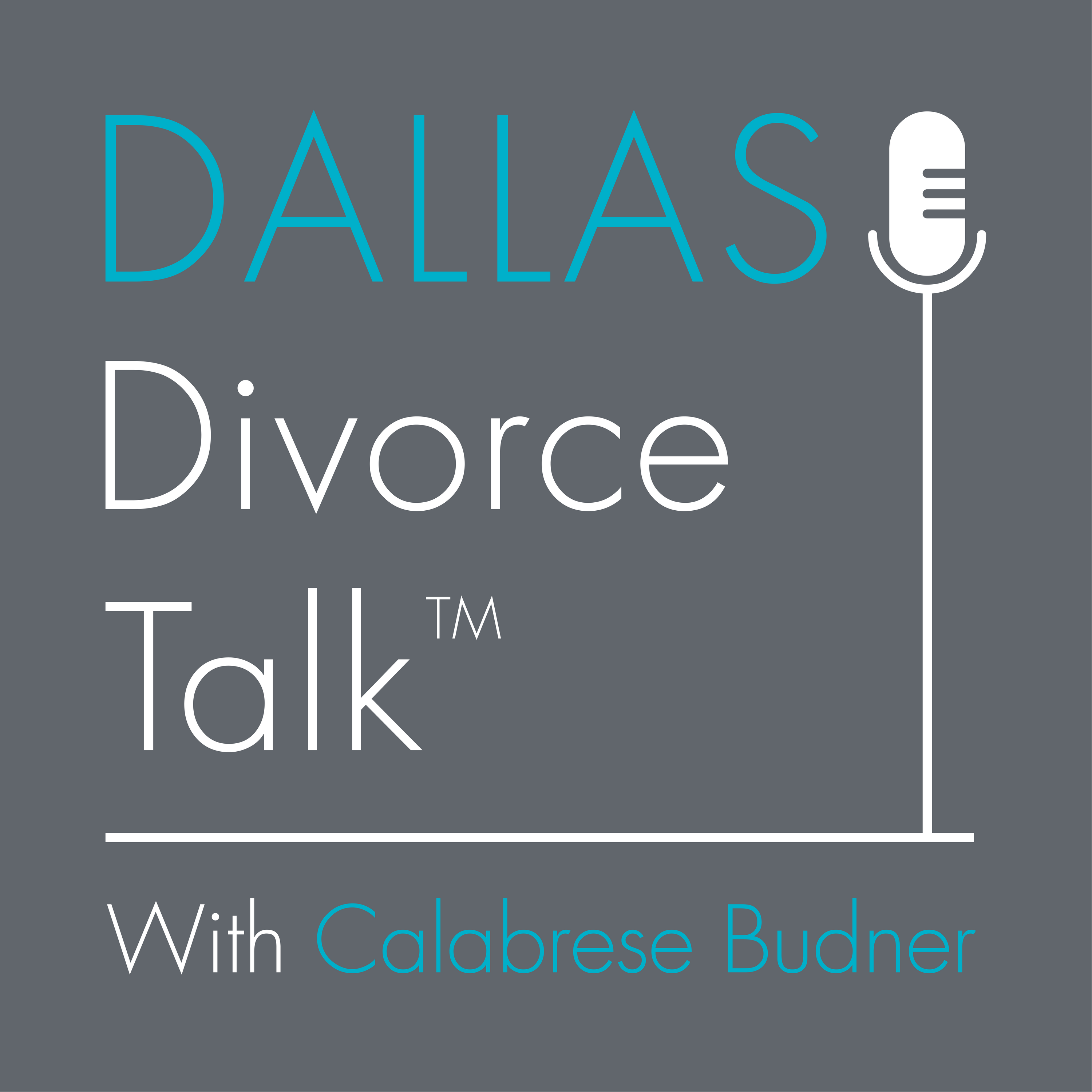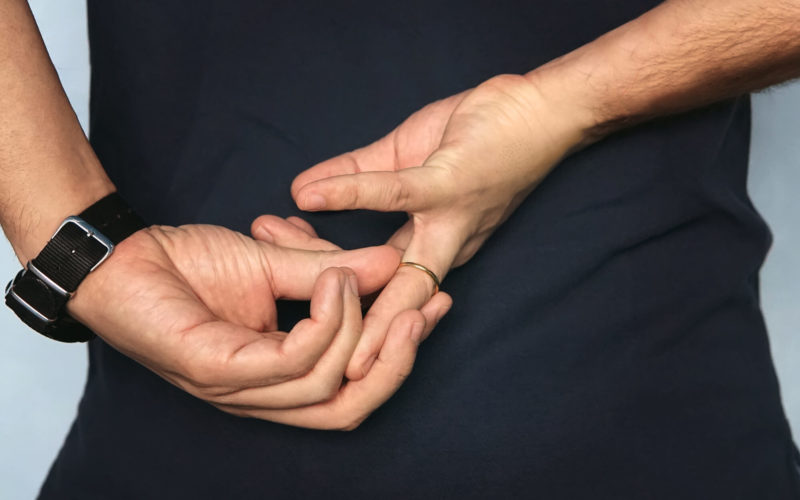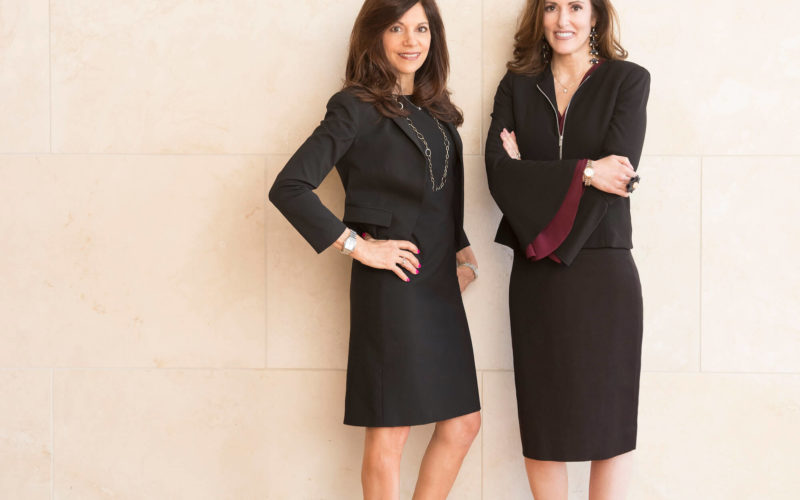Podcast
Episode 7: How to Avoid a Grey Divorce
The fastest growing divorce population is in people over 50. Find out what you can do to avoid late in life divorce.
Episode 6: January, The Month for Divorce?
Believe it or not, divorce has seasons. Why is January the big month for divorce? Is it because no one wants to ruin the December holidays? Or maybe the New Year’s Resolutions? Explore with Dawn and Carla the psychology of timing in divorce, whether there are indeed “better” times to file, and how the trends skew. Examining the patterns, they give food for thought and advice to those considering the when of divorce.
Episode 5: How to Win a Custody Evaluation
When one spouse requests an evaluation of the other, it’s common for judges to order a “custody evaluation,” a detailed assessment of both parents. The appointed evaluator interviews children, parents, teachers, and anyone appropriate to provide a clear picture of the parental situation with the “best interest of the child” as top priority. Evaluations are more prevalent now than ever. How can you best handle the scrutiny of an evaluation in addition to the obvious pressures of surviving your divorce? Dawn and Carla take the mystery out of the process while providing do’s and don’ts to put your best self forward.
Episode 4: Why You Want to Stay Out of Divorce Court
The family courthouse is different than any other kind of law: in a word, it’s a gamble. Beyond the financial expense, it is impossible to assess the risk before you are past the point of no return. No matter the facts of your case, the given is precious little time in front of the judge (who, by the way, has seen it all) to explain your side. Dawn and Carla have seen it, too, and have specific suggestions on how to navigate your divorce outside the courthouse whenever possible. Marriage is a complex dynamic human endeavor—it takes more than twenty minutes per side to scratch the surface. Listen to the tips of the trade from the ladies who know family law the best, and keep the big picture in mind.
Episode 3: What to Expect in a Divorce Consult
The number one step in divorce is the divorce lawyer consult: as many potential clients have no idea what to expect, this meeting can come with unnecessary anxiety. While it is probably the client’s first consult, Dawn and Carla have led many: let their expertise be your guide. In this episode, they will cover all things initial consult: what to expect, what to bring, and what to be sure you don’t leave without, including answers to certain pertinent questions for any potential attorney you hire! Also on the docket this podcast: process options such as litigation, collaborative divorce or a hybrid approach, Texas law property division and the notion of 50/50, the truth about alimony, and the latest on child custody.
Episode 2: I Think My Spouse is Having an Affair
It is not uncommon for us to get calls from both women and men, “My spouse is having an affair!” While the experience is too common, for the individual involved, we remember it is personal. What should you be aware of within your marriage that might help you “divorce-proof”? Hint: in large part, it has to do with who is in charge of what (i.e. does one partner know everything money and the other know everything kids but never the two meet?). In a strong marriage, BOTH participants are partners on understanding the basics of what makes their day to day lives’ together tick. When one spouse has no idea what credit cards they own and the other is unaware their middle child takes medication, this is a symptom that screams things can plunge downhill quickly. Don’t leave yourself and your marriage vulnerable by sticking your head in the sand: listen for tips to avoid the affair, and what to do if you find one already in progress.
Episode 1: Meet the Girls: Carla Calabrese and Dawn Budner
We are Dawn Budner and Carla Calabrese of the family law firm Calabrese Budner located in Dallas, Texas. We created Dallas Divorce TalkTM radio show and podcast to answer questions and provide support for all things divorce. As divorce attorneys, mothers, and women of a certain age, who better to set the record straight on the highly misunderstood state of affairs, no pun intended(!), known as divorce? Whether you are thinking about divorce, in the middle of one, married, single, or otherwise; the dish upon which we will feast in these podcasts relate, or will at some point, to you or to someone you love. No one wants to think about it, but divorce touches everyone in one way or another. And that is why we are here: for you!
In the spirit of this ambitious mission, we thought we would dive right in with the most common—and often most detrimental—myths that surround divorce. Our goal is to dismiss half-truths and misconceptions that can make what is already a painful process even more distressing. The myth we tend to hear most consistently goes something like this:
1.) I NEED THE BULLDOG/GLADIATOR ATTORNEY IN MY CORNER!
You know that blustery guy (or gal) with the pricey office and the fancy business cards and the personal license plate screaming killR on the back of the BMW? Many, many people, when first confronted with the idea of divorce, think a version of that individual is who they must hire for their lawyer, lest they be crushed by opposing counsel. Bad move. The caveman approach to restructuring family is in direct opposition to productive. When embroiled in divorce, it is easier to focus on the other person’s faults; what is challenging and infinitely better is to concede that while the spouse is responsible for some of the issues, he or she simply cannot be 100% wrong on everything. To some extent, both partners own the circumstances and decisions that led to the demise of the relationship. Divorce is a time to look inward, to admit hard truths so that ultimately emerging a healthier human being armed with awareness and strategies to prevent similar mistakes is possible. The courtroom is decidedly NOT a safe place to do this necessary internal work that will result in a better outcome. The courtroom, in divorce, is about making the other guy look bad, dredging up the past, and staying stuck. The person who wins in divorce court is the LAWYER. After all, the lawyer gets paid every time he or she attends a hearing, files a motion, argues the relevance of a fact or a date or demands further discovery. Yes, there are times when one of the parties in a divorce is simply incapable of agreement on any level; in this kind of situation, an attorney who knows how to go into court and cut through the shenanigans with authority and prowess is necessary. But aggressive for aggressive sake is counterproductive and looked upon with disdain from a family court judge, who has seen it all and then some. CAVEAT: WHAT’S THE ALTERNATIVE? Collaborative divorce, when possible, can be a less expensive, less contentious way to redefine a family and to move forward.
2.) COLLABORATIVE DIVORCE? ISN’T THAT FOR COUPLES WHO AREN’T FIGHTING?
Nope. Kumbaya is not required to collaborate. Collaborative divorce, which we will discuss a great deal in our shows, as we both believe it is an awesome alternative, is a dispute resolution option for divorce that encompasses a team approach: each spouse has an attorney, and a mental health professional as well as a financial professional round out the team. The divorce is worked out by agreement. Without having to enter a courtroom. This can be an enormous positive on many levels. Particularly for families, collaborative divorce can be a decidedly less adversarial approach that focuses on solutions instead of delving into the past and finger-pointing. Many clients, however, are not made aware of collaborative divorce as a real option when they meet with an attorney. The cynic might say most divorce lawyers aren’t focused on collaborative law because it is not as financially lucrative for an attorney as litigation (see above!). Some clients worry, “uh oh, all those team players? How much is THAT going to cost?” This is usually an individual who doesn’t comprehend how expensive litigation quickly becomes. Collaborating is generally less expensive than litigating. Before couples’ march into court fueled by anger and blow their retirement fund, exploring collaborative divorce is a smart move.
3.) I CHEATED, I’M GOING TO LOSE EVERYTHING!
Not necessarily. 90% of the cases that come into our office carry adultery as part of the baggage. Fuming spouses think, “I gotcha!” because their partner cheated: I’m going to get more money, she won’t get time with the kids, the judge is going to be on my side, etc. But the truth is, because adultery is so absurdly common, courts are desensitized. The Texas family code calls for a 50/50 division of property in divorce; whatever money is made or properties obtained during marriage, assets are split equitably. While there is a provision for “disproportionate division of property,” and this can be applied by a judge in various scenarios, including adultery, it doesn’t often end up that way. Family court judges have seen just about everything. To you, the affair is earth-shattering; to the judge, it’s another day at the courthouse. Interestingly, oftentimes what a spouse who has been cheated on actually wants is an admission and an apology. When that happens, it goes a long way toward healing for everybody. Arriving at that place with a mental health professional involved in the collaborative process is a much more likely scenario than within the litigation model, where admitting wrongdoing runs counter to the process.
So briefly, who are we? I’m Carla Calabrese; I have been a lawyer since 1991, where I started at a big firm, Haynes & Boone. I figured out fairly early that I was interested in the psychology of the law—I briefly considered going back to school for psychology—but then I realized how vital that emotional component was to family law. I was initially a litigator, but as Collaborative Divorce came to Dallas in 2000, an attorney friend approached me, saying he thought that I would be good for it and vice versa and he was right. Dallas quickly became an established leader in Collaborative Divorce. Recently, I earned my Master Credential, which is tough to do—only four attorneys in Dallas, me included, carry that distinction. I am called to this process because I believe it works. It feels good to be part of the solution in what is such a painful time for so many people.
And I am Dawn Budner: I also had excellent big firm training at Carrington, Coleman here in Dallas. I was trained in trial skills, felt the glory of some big awards in court, but ultimately realized that I felt more compelled by the pro bono family law I did along the way. After I returned to the law as my three kids got older, I knew I wanted to work with Carla and family law. I too was taken with the possibilities of Collaborative. I love to litigate, and I still go to court and engage in the litigation process with many clients, but it is with an awareness of collaborative law and the advantages: Collaborative Law training is paramount to understanding best practices and settlement options. After all, 9_% of the time, family law cases eventually settle out of court.
So that’s us! Now how about you? We are excited to explore divorce topics with you to hopefully bring perspective and clarity to what can be a daunting process.
Please know that we are here for you and any questions you might have along the way. Use either of our emails below, and we will answer relevant questions on the show to the best of our ability!
Carla@calabresehuff.com
Dawn@calabresehuff.com
Until next time on Dallas Divorce TalkTM!
Carla Calabrese & Dawn Budner
- ‹ Previous
- 1
- 2
- 3
- 4









Recent Comments